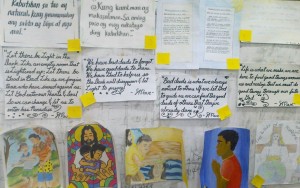In celebration of the National Correctional Weeks, the Department of Social Welfare and Development, specifically the National Training School for Boys (NTSB) conducted a series of activities which highlight the talents and desires of the residents of the said institution. 
The celebration, which was conducted under the theme, “Panginoon, Tulungan nyo po Kaming Makita ang Kabutihan ng aming Kapwa,” started with a Eucharistic celebration officiated by Rev. Fr. Reymond Holscher, SJ, who is long-time advocate for the welfare of the children in conflict with the law (CICLs). A contest on signing, slogan making contest and poster making contest were also conducted and was participated by representatives from the different cottages of the institution.
In her message, NTSB officer in charge Ms. Hayde G. Dinglasa gave emphasis on the importance of celebration, which is giving every individual, most especially minors, who had been found to have violated existing laws, a chance to correct themselves and once again be a productive member of our society.
Ms Dinglasa also added that this kind of celebration or similar center activities should be taken as an opportunity by every child-resident to showcase their talents, express their feelings and aspirations, and interact with other residents and staff, as all of these critical factors in accomplishing their respective rehabilitation and treatment plans.
Among the slogans prepared are: ‘Sa mukha mong mahabagin, tulungan mong mapasaamin, pambihirang taglay na paningin, upang masilayan kabutihan ng iba sa amin,’ and ‘Kung kami man ay makasalanan, sa aming puso ay may nakatago ding kabutihan.’
“Based on the result of the singing, poster and slogan making contests, we hope that the boys here at NTSB saw the overall goal of the activities. In as much as they are happy and enjoyed their participation in the different contests, we are hopeful that they are seeing these as part of their preparation for their eventually reintegration to their respective families and communities,” Ms Dinglasa added.***
